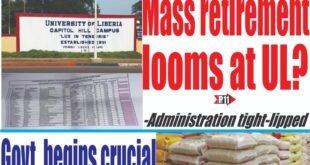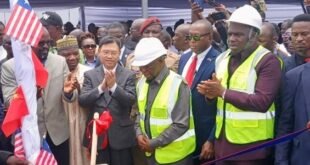By: Naneka A. Hoffman
The Government of the United States, through its Embassy in Monrovia, has praised the recently signed $1.8 billion railway agreement between the Government of Liberia and American-owned HPX/Ivanhoe Atlantic.
The multi-user railway deal, signed over the weekend, was described as a significant development. However, the signing has sparked major controversy among Liberians.
President Joseph Boakai and his delegation departed the country on Monday to attend a meeting from July 9 to 11 with U.S. President Donald Trump and four other African leaders. The departure coincided with growing public concern over the secrecy surrounding the HPX deal.
Speaking on July 9, Tarnuekollie D. Seepo criticized the deal, labeling it “illegal” due to the absence of legislative involvement.
“There was no meeting held with the Legislature, nor was the House nor the Senate informed. This is typical of the President’s style, taking unilateral actions. We just woke up to this surprise before he left,” Seepo said.
“It reminds us of how former Nigerian President Obasanjo was pressured to turn over Charles Taylor. Boakai was told he wouldn’t meet Trump unless he signed this deal. So, he did it alone.”
Seepo further accused the President of intentionally bypassing the Legislature, calling the move “criminal in nature.”
“Only America stands to benefit. They’re adept at influencing leaders to act in their own interest, not for our benefit. If money is given to Boakai, it won’t be used for internal development,” he claimed.
Alfred M. Kromah added that, in his view, the deal lacks transparency and does not prioritize Liberia’s interests.
“This is a Karnawolo arrangement. Liberia stands to gain nothing. Just look at companies like Bea Mountain and ArcelorMittal; Liberia has barely benefited from them. It’s a money-making scheme for the Executive,” he said.
Prince Harris echoed these concerns, stating that the Legislature was unaware of the deal.
“The President was wrong to sign such a major agreement alone. Liberia won’t gain from it,” he said.
Detobo Mokojarpu called the signing “an error,” demanding public clarity on the contents and duration of the deal.
“The Legislature and Senate should’ve been part of the signing ceremony. This is not a small deal for one man to handle. If Liberia doesn’t benefit, everyone will be held accountable,” Mokojarpu warned.
Mohamed S. Sackor took a more measured tone, acknowledging the potential value of the agreement but urging the President to publicly explain its details.
“This country is governed by law. We criticized past regimes for sidestepping the law, and now we’re doing the same,” he said.
“Boakai must clarify how this deal will help ordinary Liberians. Will it solve the bread-and-butter issues?” Sackor added.
Arthur G. Cooper Jr. viewed the deal as an opportunity for Liberia’s economic advancement.
“Liberia has long been tied to the U.S. If the funds are used wisely, they can create jobs and drive economic growth. A man who’s empowered economically won’t need to protest,” Cooper noted.
The $1.8 billion HPX/Ivanhoe deal has sharply divided public opinion in Liberia. While the U.S. and some local voices view it as a pathway to growth and stability, others are concerned about the lack of transparency, adherence to constitutional procedure, and the direct benefits to ordinary Liberians. As President Boakai engages with American officials abroad, many at home are demanding answers. -Edited by Othello B. Garblah.
The post 𝗟𝗶𝗯𝗲𝗿𝗶𝗮𝗻𝘀 express disappointment o𝘃𝗲𝗿 $1.8 b𝗶𝗹𝗹𝗶𝗼𝗻 𝗛𝗣𝗫 d𝗲𝗮𝗹 appeared first on Liberia news The New Dawn Liberia, premier resource for latest news.
 JamzNG Latest News, Gist, Entertainment in Nigeria
JamzNG Latest News, Gist, Entertainment in Nigeria









